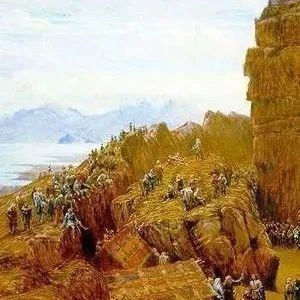Read History with Jack 43 - The Vikings Article 3 维京人3
The Viking Age was an age of changes. Changes in the territory, economy, cultural values and customs, and so many more changes all occurred thanks to the impacts brought by the Vikings. But one type of change was undoubtedly the most pioneering, if not the most influential: Changes in political structure and government system. The Vikings were some of the most brilliant and daring political experimenters of their day. They experimented with civil rights, direct or representative democracy, freedom of expression, gender equality, and an array of other avant-garde ideas of ruling a society. But they did not only experiment. The Vikings also attempted to influence, consciously or not, the old structures of medieval Europe and force them into new shapes, pushing them onto a path of gradual evolution that led to the many modern Western political designs we are so familiar with.
From my point of view, the most pioneering and jaw-dropping political experiment happened in Iceland during the 9th century, at the edge of the known world back then. A pioneering political experiment was only possible in Iceland, not in Scandinavia or any other place in Europe, because of two reasons. First, the harsh weather conditions on the island made the society extremely independent, providing the necessary, ideal soil for political experimentation. Second, most people came to Iceland searching for a freer life, to escape being ordered what to do. Thus, nobody wanted to create tyranny on this free island. These two reasons, I believe, made it possible for the Icelandic Vikings to create what is referred to as a “frontier republic,” “frontier,” since it was created literally on the edge of the known world. This frontier republic almost looked like a utopia. There was no army, no tax, no supreme ruler, and no such kind of a “big government” seen elsewhere contemporarily. There were only farmsteads and extended families living together. There was an essential public position called “Gothi.” A Gothi was a man respected for his reputation and deep knowledge of local traditions and law codes. His primary responsibility was to mediate between individuals when needed. But this Gothi was not a lord or chieftain by any respect, and if they failed their job, they could get replaced. Additionally, among all the Gothar (A plural form of Gothi), the people elected the Lawspeaker for a three-year term. The Lawspeaker was the closest thing the republic had to a national figure. At the annual Althing or a great assembly in which each farmstead would send a representative to discuss the most vital decisions, the Lawspeaker must recite from memory one-third of the entire Icelandic laws with the other Gothar checking. Other free men on the island could “announce the settlement of a farm, or a marriage, or [sign] a business contract” during the Althing as well. In the Icelandic frontier republic, everyone was free and equal, and the society depended on self-regulation and the wisdom of the entire population. This kind of groundbreaking or innovative democratic political structure was only devised by the Vikings and would become, ultimately, the principal structure in the Western hemisphere.
The Vikings not only innovated on their own, but they also brought impacts on preexisting forms of government in the European mainland. In England, the peace treaty with King Alfred of Wessex in 878 allowed the Vikings to reign over a region known as the “Danelaw.” Within the “Danelaw” boundaries, the Vikings could keep their way of ruling and social norms. When the English kings gradually devoured the “Danelaw,” their way of ruling, thus, was impacted by how the Vikings ruled the region. For example, the people in the Viking lands were allowed to decide their laws. The freedom of Vikings affected this relatively liberal approach to decentralize political authority. In France, as the political structure of Charlemagne’s old Holy Roman Empire crumbled under the blows from the Vikings, a re-formation of political power took place, as the king handed some of the centralized control down to dukes to better prepare individual provinces and regions for Viking attacks. This handing down of power resulted in the rise of the nobility and less centralization of power on one person. Therefore, the Vikings helped construct one of the most classic chivalric states during the Middle Ages, with the nobility rising to power. Parts of France, namely Normandy, were also under direct control by the Vikings, and thus their form of government must be directly impacted by Viking traditions.
Overall, the Vikings both experimented and brought impact to political science and governmental systems. They were one of the first to effectively attempt to run a democratic state under which every free man and woman were equal. This structure focused on human rights, and a liberal, citizen-governed state would be part of the foundation of modern-day Western representative and direct democracies. The Vikings in Europe, by conquering the old European powers, injected fresh blood into the political systems of European states by weakening authoritative centralization and other means to achieve greater efficiency. Their epic and shocking stories with governments prove that for a nation to be advanced and efficient in governance, an open, free mindset eager, determined for exploration and undaunted experimentation is above all needed.
WORKS CITED
Brownworth, Lars. The Sea Wolves: A History of the Vikings. United Kingdom, Crux
Publishing, 2014.
维京时代是一个变化的时代。由于维京人带来的影响,领土的变化、经济的变化、文化价值和习俗的变化以及其他许多变化都发生了。但是,有一种变化即使不是最有影响力的,也肯定是最具开拓性的--政治结构和政府系统的变化。维京人是他们那个时代最杰出和最大胆的政治实验者。他们尝试了公民权利、直接或代议制民主、言论自由、性别平等,以及其他一系列管理社会的前卫思想。但他们不仅进行了实验,维京人还试图有意识或无意识地影响中世纪欧洲的旧结构,并迫使它们形成新的形态,把它们推上一条逐步演变的道路,从而形成我们所熟悉的许多现代西方政治结构。
在我看来,最先锋的、令人震惊的政治实验在九世纪发生在当年已知世界的边缘--冰岛。开拓性的政治实验只可能在冰岛进行,而不能在斯堪的纳维亚或欧洲任何其他地方进行,主要有两个原因。首先,岛上恶劣的气候条件使社会变得非常独立,这为开创性的政治实验提供了理想的必要条件。第二,大多数人来到冰岛是为了寻求更自由的生活,以逃避压迫和强制性命令。因此,没有人想在这个自由的岛屿上创造一个暴政。我相信,这两个原因使冰岛维京人有可能创建一个被称为 "边疆共和国 "的政体,"边疆 "是因为它实际上是在已知世界的边缘创建的。这个边疆共和国几乎看起来像一个乌托邦,没有军队、没有税收、没有最高统治者,也没有同时代其他地方看到的那种 "大政府"。那里只有农庄和生活在一起的大家庭。有一个重要的公共职位叫 "Gothi"。Gothi是一个因其声誉而受到尊重的人,对当地的传统和法律规范有深刻的了解。他的主要职责是在需要时在个人之间进行调解。但这个Gothi在任何方面都不是一个领主或酋长,如果他们的工作失败了,他们就会被替换。此外,在所有Gothar(Gothi的复数形式)中,人们会选出一位任期三年的“法律发言人”。法律发言人是共和国中最能代表“国家形象”的人。在每年的大议会Althing中,每个农庄都会派出一名代表来讨论最重要的决定,法律发言人必须在其他Gothar的检查下背诵整个冰岛法律中三分之一的内容。岛上的其他自由人也可以在大议会中 "宣布一个农场的定居,或一个婚姻,或[签署]一个商业合同"。在冰岛的边疆共和国,每个人都是自由和平等的,社会依赖于自律和全体人民的智慧。这种开创性或创新性的民主政治结构只由维京人设计,并最终成为西半球的主要结构。
维京人不仅自己进行了创新,还对欧洲大陆原有的政府形式带来了冲击。在英格兰,878年与威塞克斯的阿尔弗雷德国王签订的和平条约允许维京人统治一个被称为 "Danelaw"的地区。在 "Danelaw "的边界内,维京人可以保持他们的统治方式和社会规范。当英国国王逐渐吞噬 "Danelaw "时,他们的统治方式也因此受到了维京人统治方式的影响。例如,维京人土地上的人们在重新被英国人征服后允许决定自己的法律。这种相对自由的法制权威下放方式无疑受到了维京人自由的影响。在法国,随着查理曼大帝的旧神圣罗马帝国的政治结构在维京人的打击下崩溃,政治权力重新形成,国王将一些中央集权的权力交给公爵,以更好地准备个别省份和地区应对维京人的攻击。这导致了贵族的崛起,权力不再集中在一个人身上。因此,维京人帮助构建了中世纪最经典的骑士制国家之一,贵族们纷纷上位。法国的部分地区,即诺曼底,也在维京人的直接控制之下,因此它们的政府形式肯定直接受到了维京人传统的影响。
总的来说,维京人在政治科学和政府系统领域进行了实验,并带来了影响。他们是第一批有效地尝试管理一个民主国家的人,在这个国家里,每一个自由的男人和女人都是平等的。这种注重人权的结构和自由、公民管理的国家将成为现代西方代议制和直接民主的基础的一部分。欧洲的维京人通过征服欧洲的旧势力,通过削弱权威性的中央集权和其他手段,为欧洲国家的政治制度注入了新鲜血液,从而实现了更高的效率。他们与政府形态的史诗般的震撼故事证明,一个国家要想获得先进的、高效的统治,首先需要一个开放的、自由、理性的心态,渴望、决心进行探索和不畏艰险的实验。
- 本文标签: 原创
- 本文链接: http://www.jack-utopia.cn//article/417
- 版权声明: 本文由Jack原创发布,转载请遵循《署名-非商业性使用-相同方式共享 4.0 国际 (CC BY-NC-SA 4.0)》许可协议授权










